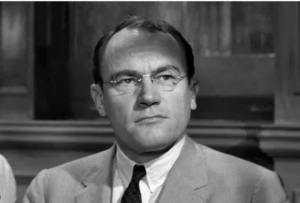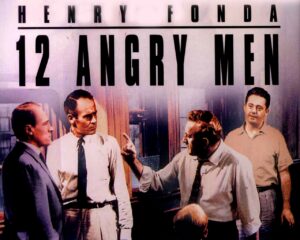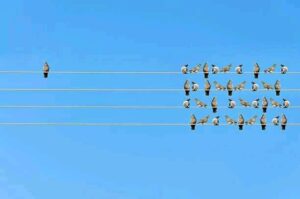Heroism shows itself in many different ways. There are obvious heroes who stand up for what is right, but there are also less obvious heroes who play a crucial role in supporting the main hero. These background heroes are essential; they often show the same remarkable courage as the main hero.
The 1957 film, 12 Angry Men, is a fascinating portrayal of different types of heroism and leadership. Some of this heroic leadership is obvious and some not-so-obvious. Some is direct and some indirect.
Let’s start with the direct and obvious. Henry Fonda plays Juror Number 8, a man who at the outset of a jury’s deliberation is the only juror with the courage to stand alone in voting for acquittal. The other eleven jurors apply pressure on Number 8 to change his vote to guilty, and some of them do so in rude and hostile ways. But Juror 8 doesn’t budge.
Juror 8 does what true heroes do: He stands up for what he believes is right, even in the face of severe social pressure to do otherwise. Slowly but surely, Juror 8 is successful in poking holes in the prosecution’s case, and by the end of the film all the remaining jurors are convinced to render a “not guilty” verdict.
Juror 8 is clearly the “star” of the movie, the character who gets the most screentime and is identified by viewers and movie fans as the hero of the story. And rightly so.
But Juror 8’s heroism could never have happened without help from other jurors, especially Juror 9 sitting next to him. Juror 9’s heroism is less splashy than Juror 8’s, but the heroic actions of Juror 9 made Juror 8’s heroism possible.
The First Follower Makes Heroic Leadership Possible
We all know that heroes can’t do their heroic work alone. Sometimes a hero standing alone, expressing an unpopular message, is seen as a dangerous lunatic. This scenario describes what happened to Juror 8 at the beginning of 12 Angry Men.
Juror 8 needs at least one follower, or else he and his heroic ideals will be squashed. Sitting next to him,  Juror 9 takes a chance and steps up joins Juror 8, not necessarily because Juror 9 agrees with Juror 8, but because he believes that with a life at stake all voices should be heard. Juror 9 is keeping an open mind to a possible truth.
Juror 9 takes a chance and steps up joins Juror 8, not necessarily because Juror 9 agrees with Juror 8, but because he believes that with a life at stake all voices should be heard. Juror 9 is keeping an open mind to a possible truth.
As this short video demonstrates, “The first follower transforms a lone nut into a leader.”
Juror 8 endures some ridicule and pressure to change his vote to guilty, and when Juror 9 joins Juror 8, he is also at the receiving end of derision and anger. Juror 9’s courage and risk-taking is arguably as heroic as Juror 8’s.
By stepping up to support our lone hero, Juror 9 allows time for the jury to reconsider some of the evidence in the case. During the ensuing jury discussion, one piece of crucial evidence loses credibility, leading to another juror, Juror 5, to change his vote to not guilty.
At this point our hero, Juror 8, has a solid backing, a critical mass of followers. There are now two legitimate factions in the group rather than one lone nut against the world. Juror 9 made this possible and also opened the door to Juror 5 and others to be receptive to a different interpretation of the facts of the case.
Other Heroes in 12 Angry Men
I’m going out on a limb here to proclaim Juror Number 4 as a hero, too. Played by E. G. Marshall, Juror 4 opposes our hero throughout much of the story, insisting that the defendant is guilty despite all the holes in the evidence as pointed out by Juror 8 and his followers.
 How in the world is this nemesis a hero?
How in the world is this nemesis a hero?
Juror 4 is an independent thinker, a person of integrity who simply has different criteria for reasonable doubt. He opposes Juror 8 for all the right reasons. Juror 4 stands up for what he believes is a just cause. His opposition to Juror 8 is not based on personal prejudice or egoic stubbornness. It’s based on his interpretation of the facts of the case.
Toward the end of the film, Juror 4 finds himself in a small group of three who continue to vote guilty. Finally, after being presented with logical reasons to doubt the testimony of the main eyewitness, Juror 4 declares that he now has a reasonable doubt and joins the majority in voting for acquittal.
Juror 4 is heroic for withstanding pressure to do what he believes is right, much like Juror 8 at the beginning of the story. He is also heroic for being willing to admit he was wrong.
In contrast, Jurors 3 and 10 are far from heroic. They believe the defendant is guilty to the bitter end, for reasons based on personal and cultural prejudice. Number 10 is eventually shamed into conceding he is wrong, and Number 3 has an emotional breakdown and epiphany regarding his personal prejudice.
At the end, the jury has become unanimous in favor of acquittal, having swung 180 degrees from its original position, all thanks to Number 8’s heroic leadership, and Number 9’s heroic followership.
Two Additional Signs of Heroism in 12 Angry Men
- Nine of the 12 jurors show heroic consciousness, defined as the ability to see the world broadly and clearly without the ego getting in the way. Heroically conscious people do not divide the world into “us” versus “them”; they seen nuance and complexity. The unconscious jurors were Numbers 3, 7, and 10. These jurors had personal issues that blinded them to the truth. Until the lenses of their eyes were cleared, they could not see the world with an open, honest, and broader perspective.
- There were three underdog heroes, defined as heroes who must overcome adversity including negative stereotypes about them.
 Juror 5 grew up in poverty and was accused of being “trash” by Juror 10. In reality, Juror 5 sees the world with clarity and sensitivity.
Juror 5 grew up in poverty and was accused of being “trash” by Juror 10. In reality, Juror 5 sees the world with clarity and sensitivity.- Juror 9 is an elderly man who is mocked for being an old useless man by Jurors 7 and 10. In reality, Juror 9 shows great wisdom in his ability to read people and “see” far beyond the facts of the case.
- Juror 11 is a recent immigrant from eastern Europe. He speaks with a heavy accent and is derided for being “foolish” by Jurors 7 and 10. In reality, Juror 11 sees the world with compassion, clarity, and objectivity.
In conclusion, 12 Angry Men is a compelling story of heroism at several levels. It showcases the courage needed to be the only dissenter in a group, and the equal courage to be the first follower of that dissenter.
Heroism is not the monopoly of great leaders; it is also a central characteristic of great followers.
– – – – – – – – – – – – – – – – – – – – –

